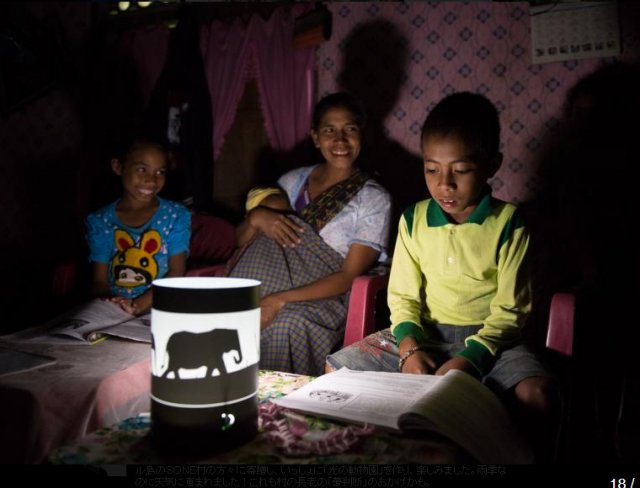
Nov 19, 2025
- Products & Solutions
- Stories
- Konosuke Matsushita
- Technology
- R&D
- Business Policy
- Home & Personal Solutions

Panasonic's project to donate solar lanterns to regions with no access to electricity, "Cut Out the Darkness," features a "Zoo of Light" during Phase 2.
West Timor, Indonesia - Panasonic donated 110 solar lanterns and shades to the village of Sone, in west Timor, Indonesia, which has no access to electricity. The lanterns featured shades bearing animal designs that were submitted to an international design campaign called "Cut Out the Darkness." Villagers enjoyed a special moment when all the lights were turned on at once, making a "zoo of light" appeared before everyone's eyes.
This donation was a part of Panasonic's fiscal 2014 (to end of March 2015) activities for its "100 Thousand Solar Lanterns Project," in which a total of 100,000 solar lanterns will be donated to off-grid communities around the world by 2018. That year happens to be the hundredth anniversary since Panasonic was founded.
In hopes of getting more people to know about the challenges faced by people who live without access to electricity, the "Cut Out the Darkness" project invites people to participate by personally designing shades for the lanterns. Selected designs are then turned into actual shades and donated together with solar lanterns to homes and schools in areas without electricity. For the first round, 111 designed shades and solar lanterns were donated to Sumba Island in Indonesia in March 2014.
For the second round, Panasonic called for design submissions with animal motifs. Thanks to collaboration from the Behance Japan Tokyo Community, an online portfolio for artists and designers, Panasonic received more than 300 designs from around the world.
This time, 110 pairs of solar lanterns and shades with designs chosen by popular online vote were donated to the village of Sone in East Nusa Tenggara, Indonesia. When all the lanterns were switched on at once by villagers during the donation ceremony, a "zoo of light" appeared from the darkness, before everyone's eyes. Information summarizing the project will soon be released on the project website.
This is the second year Panasonic made donations to Indonesia in its "100 Thousand Solar Lanterns Project." Panasonic donated 1,000 solar lanterns in March 2014 and a Panasonic-sponsored Japanese famous football team named GAMBA Osaka donated ten solar lanterns in January 2015 to Sumba Island and Sabu Island. In February 2015, 1,010 solar lanterns (including those donated through "Cut Out the Darkness") were delivered to the Institute of Business and Economic Democracy Foundation (IBEKA), an NGO that supports communities by introducing renewable energy, and to Kopernik, an NGO that delivers innovative technology and products to communities in the developing world with the greatest need. Thus a grand total of over 2,000 have been donated so far to Indonesia.
Currently, about 1.3 billion people live without access to electricity worldwide. Homes in these regions commonly use kerosene lamps for lighting, but the fire and smoke from these lamps pose serious fire and health risks. Panasonic solar lanterns can be used as lighting at night, thanks to the battery, which stores energy generated by sunlight during the daytime. The lanterns also reduce the inherent danger of fire from kerosene lamps, as well as health hazards from smoke, and CO2 emissions. Solar lanterns are expected to solve some of the challenges faced by areas that have no access to electricity.
The "100 Thousand Solar Lanterns Project" utilizes Panasonic's technologies and products to help solve social challenges in emerging and developing countries that have poor electrical power conditions, by making donations to non-profit/non-governmental, humanitarian, and international organizations. For Asia, Panasonic expanded its list of recipient countries this fiscal year to include Malaysia, in addition to Indonesia, Cambodia, Myanmar, India and the Philippines, which previously received lanterns.
Panasonic plans to continue working on the "100 Thousand Solar Lanterns Project" as part of its efforts to pursue "A Better Life, A Better World" and to contribute to the achievement of the United Nations Millennium Development Goals (MDGs).
Contact
COTD Project Office: info-cotd@hit-bits.com
The content in this website is accurate at the time of publication but may be subject to change without notice.
Please note therefore that these documents may not always contain the most up-to-date information.
Please note that German, Spanish and Chinese versions are machine translations, so the quality and accuracy may vary.